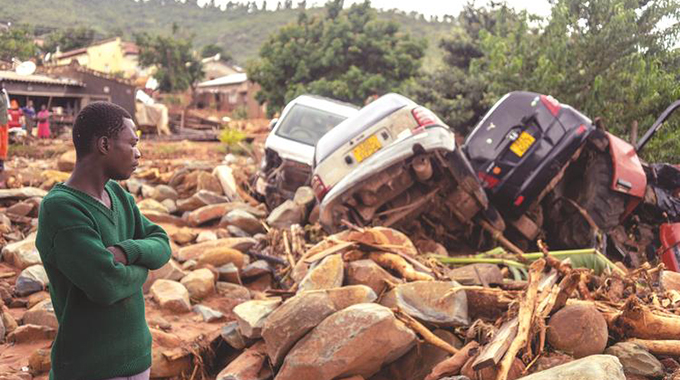Attachment to home, prelude to disaster

Isdore Guvamombe Assistant Editor
Until Cyclone Idai struck Chimanimani and Chipinge recently, generation-after-generation had lived here, in harmony with nature and regulated by the seasons.
That is, for all that the elements that people endured, and enjoyed.
People had a rich history and communion with the land. It was their all. After all, home is sweet, regardless of how it looks. It is home. Home!
When word of Cyclone Idai came before the disaster, many vulnerable people developed torpor. The timbre of their narrative, analysis, opinion and attitude since time immemorial they had been warned of cyclone after cyclone which did not culminate into anything serious.
The only other time they were troubled, was by Cyclone Eline in 2000, but most of them managed to climb to slightly higher ground. I qualify the word “slightly” here because, that time water levels and debris avalanches were very minimal.
Insignificant even! Most of the villagers were out of danger, without even evacuating except a few in Chinyamukwakwa in Chipinge West.
Even Ngangu, the township that is now a quintessence of death, was not affected by past cyclones.
Running on this historical plinth, they remained grounded at home, proceeded with their domestic chores as if nothing was happening.
“I am realising everyone is emotionally attached to their home. It is hard to leave home even when warned. There is always this emotional attachment to home. Let us face it and stop blaming the Government, it is just hard to leave home.
“So we ignored the warnings until it was too late. Reality dawned when the avalanche arrived in the darkness of night. There was panic and pandemonium. In the confusion, some people ran into their death instead of running to safety.
They tried to run to the mountain where the rocks and debris avalanche were coming from and got swept away.
“Some hid behind houses and precast concrete walls, but were swept away with them, when they gave in and got washed away. It is hard to describe the pandemonium,’’ said John Saurombe a resident of Ngangu, whose house was missed by the avalanche by a few metres.
It is a trite, but true observation that most of the people who survived in Ngangu were just lucky that the avalanche did not reach their homes. They would have perished. No one took hid and moved from home ahead of the cyclone, despite Ngangu being a modern township with access to television, newspapers, social media and all.
It is also critical to understand the geography of Chimnimani and why Idai hit mostly growth points and business centres than villages.
Modern Chimanimani was founded by Thomas Moodie in 1895 and he named it Melsetter after Moodie’s family home in Scotland. The name was changed in 1982, after Zimbabwean independence (1980) to Mandidzudzure, but after consultation with local residents, it was changed to Chimanimani.
The population by 2012 census was 135 000 people with 27 000 households. This is very sparse especially in communal lands. Settlement pattern ranges from linear in the western part of the district to random in the eastern part of the district especially in communal areas.
Most of the areas have well defined patterns due to a high level of land use planning in their areas. However, in the western parts settlements follow major sources of water supply and communication like major rivers and roads.
The biggest rivers in the eastern part of the district are Rusitu with its tributaries being Nyahode, Mutsangazi, Chipita, Haroni then Musapa near Chikukwa communal lands.
To the West, the biggest rivers are Save and Odzi which have major tributaries of Nyanyadzi, Umvumvumvu and Wengezi.
At Peacock, a business centre on the bank of Nyahode River, west of Chimanimani Town, all the 16 shops and tuckshops were swept away. It is believed 30 people were swept away.
“Those who blame Government preparedness did not experience what happened here. We got all the warnings. We listened to radio and read newspapers, but leaving home is just hard. It is not easy to leave home over a danger you have not seen or experienced. Who does that? To us it was just another cyclone coming and most unlikely to hit us. Nothing serious. We grossly underestimated Idai.
“When the cyclone came, we just witnessed sustained heavy rains and there were not much winds, but we saw the river flood by the time I left my tuckshop to sleep over at friend’s house at Charter Estates, about 2km away.
“I was shocked in the morning to find just the ground. Everyone and everything was gone. Peacock business centre is now flat land. No one believes you today, when you say there were shops here. You only see one or two cement foundations. The rest is gone,” said Nelson Sachikonye.
Nelson lost his shopkeeper and his wife.
The villages are dotted, but even there the people developed a wait and see approach.
One of them Grace Satiya (59) of Ward 16 in Chimanimani said she did not see the reason to leave home until disaster struck. She lost her child, Agreement Mungana and uncle, Laison Mungana, to the cyclone.
“We never believed it was going to be something serious. We heard all warnings, but it was hard to leave home and our little belongings. But in the second day of the heavy rains, I heard the sounds of water flowing from the mountains down into Nyapana River. It carried heavy mud, stones and trees.
“I then raised alarm in a bid to alert other people who were in the house. My uncle immediately moved out of one of the huts to save my daughter who slept in another hut. Unfortunately, he was swept away before he could get there. The huts collapsed. My child was swept away, too,” she said.
After a while she began searching for her child and uncle along the banks of Nyapana River. During the search she spotted one of the gumboots which Laison was wearing, trapped between stones.
“We later found him buried between boulders and sand. Up to now we have not yet found my child. We have exhausted all our efforts and chances of finding him are now next to none,” she said.
The refusal to leave home was common narrative.
The magnitude of Idai was never understood until the aftermath. It is never time for blame game. No one ever thought the disaster would be this big. It is a lesson for us all. Had many people left for better places, many deaths would have been avoided.
Chief Fortune Charumbira, who toured the area this weekend, said the disaster had made traditional leaders rethink about settlements and attitude to the disaster warning.
“This has made us think hard. Everyone from chiefs to village heads must start working with the Government on a new settlement plan that is safe and durable. If it means relocating people to somewhere so be it. What has happened is very bad,’’ he said.
In the final analysis, the inertia to stay home against warning contributed a lot to the number of deaths. And, so did, history. The history of never experiencing such a cyclone.










Comments